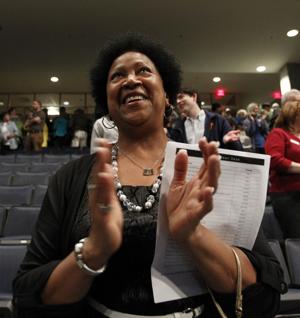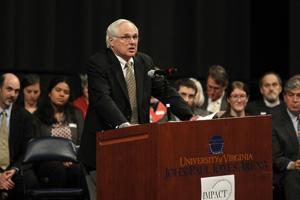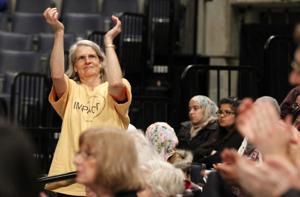April 30, 2015. The Daily Progress.
Inside the Albemarle-Charlottesville Regional Jail and the Blue Ridge Juvenile Detention Center, 3,150 people — or 70 percent of the inmate population — suffer from an addiction to drugs or alcohol, according to statistics from Interfaith Movement Promoting Action by Congregating Together, or IMPACT.
Women are particularly vulnerable because there are no residential treatment programs in Charlottesville or Albemarle County for them, said IMPACT Executive Secretary Sheila Herlihy.
During the latter half of 2014, approximately 70 people had to leave the community to receive substance abuse treatment at a cost of $800 to $3,000 per person, Herlihy said. About 30 women couldn’t receive treatment because centers outside the region were unable to accommodate them, she said.
“We know there are people within our community who need these services and don’t have access to them,” Herlihy said. “We’ve heard their stories. The services we have are good, but residential treatment is very necessary for people who simply can’t deal with their problems at home.”
Those statistics were among reasons why members of 27 local Christian, Jewish, Muslim, and Unitarian Universalist congregations gathered at the ninth Nehemiah Action Assembly chose to make a community-wide call to support those facing drug and alcohol addiction. Marketed as the largest annual regional public meeting, leaders and members of the regional faith community also confirmed commitments from Albemarle County and Charlottesville officials.
Working in conjunction with Region Ten, city and county officials would be able to address a serious problem plaguing the community, IMPACT leaders said at the Thursday night event in John Paul Jones Arena.
“It is an issue that several members have brought to our attention,” Jan Godfrey, IMPACT executive board vice president, said.
“We hold ourselves accountable as people of faith to help our brothers and sisters that are facing injustices in regards to substance abuse treatment,” Godfrey continued.
Col. Steven Sellers, chief of Albemarle County police, said after the event that drug and alcohol abuse often plays a role in the lives of those who routinely become engaged with the criminal justice system.
“Any kind of prevention activities will certainly impact crime in the community in a positive way,” Sellers said. “It’s been proven to be effective.”
Deputy Albemarle County Executive Doug Walker, Charlottesville Assistant City Manager Mike Murphy and Region Ten Executive Director Robert Johnson all agreed to four commitments outlined by IMPACT officials:
» organizing a three-year plan to increase substance abuse treatment for men and women;
» holding a joint meeting with city, county and Region Ten officials within 30 days to develop the plan;
» sending an outline of that plan to IMPACT’s executive board by Sept. 1; and
» giving a presentation of the report at IMPACT’s scheduled annual assembly on Oct. 26.
Additionally, Region Ten could build a $2 million residential treatment center as part of the plan, Johnson said, but financial support to build it and pay for increased staffing and maintenance could cost about $200,000 annually. The facility would have rooms for eight women, eight men and two children.
“We truly believe this can be done,” Johnson said. “I believe it, and our staff believes it. That’s our plan that we hope to stick to it. We are hoping to make an impact as well.”
While Walker and Murphy agreed to the commitments, no specific amount of funding was promised due to the meeting’s location in the fiscal year.
Imam Tyler “Ali” Roach, IMPACT co-president and a worship leader with the Islamic Society of Central Virginia, said he was confident the new commitments city, county and community leaders made Thursday would also be fulfilled, “God willing.”
“I’m very grateful and happy,” he said. “With prayer and hard work from our community leaders, I expect good results.”









